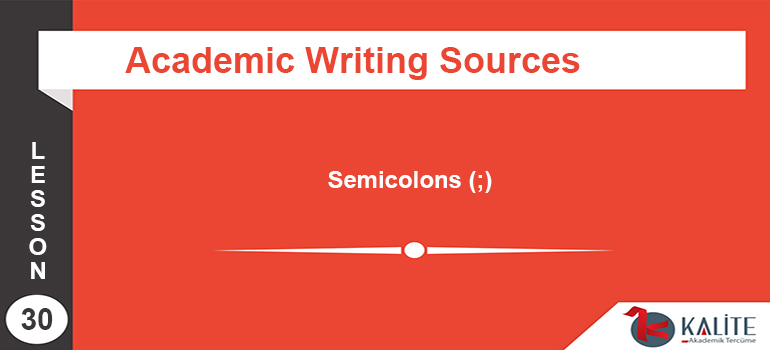
Semicolons (;)
In contemporary academic writing, the oft-abused semicolon is appropriately deployed in only two situations: first, in place of commas when a list a is complex and, second, where periods could otherwise go. In the second case, it’s used when the connection between two sentences is closer than a period would suggest.
First use – semicolons in place of commas in a complex list
Lists normally employ commas to show the divisions between items, as in “The spies would travel by land, air, and sea.”
However, when the items in a list are complex, especially when an item uses internal commas, semicolons are used instead. Using a semicolon, you can ensure that your reader is not confused about whether a certain comma indicates a new item in the list or works for some other purpose.
| Example |
| “The spies would travel by land, in the cars of freight trains; by sea, in the hidden smuggling compartments of merchant vessels; and by air, in the guise of stewards and stewardesses.” |
Second use – semicolons where periods could go
Semicolons and periods signal different things to your reader, so you should not treat them as interchangeable.
That said, an easy way to tell whether your semicolon is grammatically sound is to ask whether it would be grammatical to replace it with a period. (In more technical language, excluding complex lists, a semicolon can be used only when preceded by one independent clause and followed by another).
A semicolon is more like a weak period than like a strong comma.
The most common semicolon mistakes misuse semicolons as other pieces of punctuation.
Semicolon for a comma.1
| Examples |
| The journal would not even consider the article without a properly formatted reference list; which it did not have. |
| The journal would not even consider the article without a properly formatted reference list, which it did not have. |
1. Classical English writing sometimes deploys semicolons as strong commas, but this is archaic usage not supported by current English grammar guides.
Semicolon for a colon.
| Examples |
| “He took three things on his hike; his lunch, his binoculars, and his trusty walking stick.” |
| “He took three things on his hike: his lunch, his binoculars, and his trusty walking stick.” |
| (note: Both of these misuses of semicolons error produce sentence fragments; see our article on sentence fragments for more examples) |


